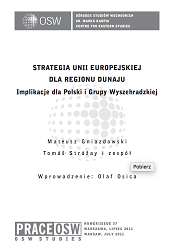The EU Strategy for the Danube Region. The implications for Poland and the Visegrad Group
The EU Strategy for the Danube Region. The implications for Poland and the Visegrad Group
Author(s): Mateusz Gniazdowski, Tomáš Strážay
Subject(s): Politics / Political Sciences, Politics, International relations/trade, EU-Approach / EU-Accession / EU-Development, Geopolitics
Published by: OSW Ośrodek Studiów Wschodnich im. Marka Karpia
Keywords: European Union; Danube Region; Poland; Visegrad Group
Summary/Abstract: The Danube strategy is the second example, after the Baltic Sea strategy, of the growing importance of macro-regions in the EU. The regional policy is being more and more often looked at through the prism of not only ensuring internal cohesion but also promoting better connection for a country with its external – both EU and non-EU environment.
Poland is a Baltic Sea strategy contributor, but has not been incorporated into the inner circle of states preparing the Danube strategy. The challenge for the Visegrad Group is to define a position on the role of macro-regional strategies in building the cohesion of Central Europe and the harmonic development of the whole EU. Demands for a better co-ordination of EU policies and funds in order to pursue macro-regional strategies should also be treated as a call for closer co-operation between Poland and its southern neighbours who are directly involved in the Danube strategy.
Series: OSW Studies
- Page Count: 124
- Publication Year: 2012
- Language: English
- eBook-PDF

